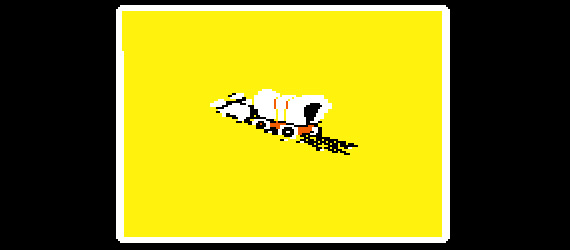Every morning and every night I cleaned up the dog’s piss. At 17, he’d lost the ability to hold his bladder long enough to get outside. This had been going on for long enough that I wondered if he was trying to get to the dog door any more, or if where he always peed, on the floor in the room closest to the dog door, had become his new habit. I’m not sure exactly what I mean by “habit,” in that case. In theory, the normative force of habits comes entirely from their repetition; if it’s a habit, it’s not something you should do, it’s something you do. But we’re always trying to co-opt our habits into being socially productive, so that the force of habit does the moral work for us, or as Perfume Genius puts it, “how long must we live right before we don’t even have to try?” I pretended that my habit was to clean up his urine and feces every morning and every night, but often it was only one or the other in a day. I would often wait for the puddles to dry up, so that it could be sprayed with something in a bottle and wiped up with fewer paper towels. As they dried, the puddles grew crystals, like yellow ponds freezing over. This happened every day, but each time I saw a new puddle of pee, I felt personally offended, as if he had broken a promise to me.
I don’t remember being a bed wetter, but I know someone who does. His brother didn’t wet the bed at the time, and, feeling alone, he was in the perfect condition for a support group to emerge. He found out that many of his friends at school also wet their beds, and felt, for lack of a better word, relieved. At which point his parents put a plastic sheet on his bed.
Dreams that let me know that I have to pee really bury the lede, and always come with someone observing. In one dream, the relation I can only call my brother in law followed me into the bathroom of a hotel, where he sat down to wait for me for me to pee. I woke up, the message having been received by virtue of the impossibility of peeing in the dream. The feeling of needing to had been intensified by being unable to because watched. A bed wetter must somehow internalize the observer judging them for not having control over their bladder during sleep, when nobody has control over anything.
The origin of the phrase “taking the piss” is, I read, in reference to morning erections that come on when sleeping with a full bladder. Erections apparently being divisible into real ones made of desire, and fake ones made of piss, taking the piss out of someone’s erection is like taking the wind out of an argument. However far the phrase has departed from the original referent, to take the piss out of something is to soften fatuous speech. Language that is excessive, threatening to burst but annoyingly bloodless, is piss. To be pissy is to be unreasonably irritable, and, like laying in bed and convincing myself I don’t really have to pee, the anger seems aggravatingly avoidable. Confessing is like pissing: it’s a relief, and then it stinks. A sense that the confession came from an imposter of myself follows confessing, and if I could just confess again, I would release my heart and bleed on the confessor, not just whiz.
This could be called confession hangover, and it can also go the other way, of never wanting to confess again. Drinking makes you pee a lot, making “getting pissed” an extremely intuitive idiom, and when you wake up you’re tired of peeing. Hungover, you’re all out of fucks, which, if you have an outsize sense of politeness, can feel like a relief. Having taken all the piss out of yourself, there is only blood left.
Limerance is a very urinal phenomenon. I recall being on its receiving end, and being asked questions that were at once too personal, and, like the nearly orange urine of dehydration, thick with the asker’s own products. I found myself avoiding talking to my limerant, because I was afraid of seeing in her speech a doppelganger of myself, yeasty and fermented by her imagination.
But to take my strained, fidgeting from foot to foot bodily metaphor further, piss is necessary, the result of substances passing into the blood. I’d like to think of myself as a creature without the need to void, but that would mean never taking anything in, never being subject to anything. Unbearable conversations that I spend an exasperating amount of time privately taking the piss out of are unbearable to the degree that I perceive their sociocultural determination. One would like to think there’s a yellow river that one occasionally has to ford, and in which some unfit people drown, as in a game of Oregon Trail, but we’re all wading, splashing each other with our footfalls. The perception of the internet as an extraneous element in our lives that we need to “detox” from, is down to the desire to be autonomous, to be purely agents in the social field, to get it all out of our system.
